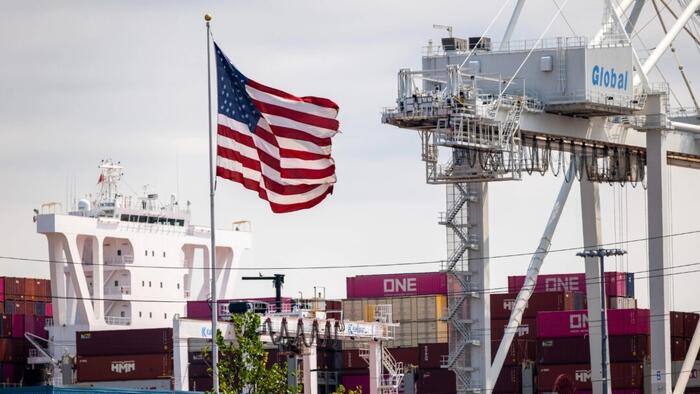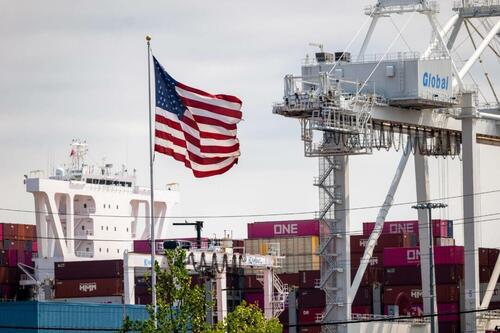


Authored by Victoria Freedman via The Epoch Times,
Treasury Secretary Scott Bessent announced on Sept. 2 in a post on X that tariff revenues exceeded $31 billion in August, setting a new record high.
The Treasury’s latest Daily Statement showed $31.37 billion in tariff revenue as of Aug. 29, totaling $183.56 billion in the fiscal year to date.
Bessent wrote on X: “Now that August is in the books, tariff revenues topped over $31 billion in the month: a new record high. As collection continues to grow, the Trump Administration is fixing the financial shambles it inherited.”
Last week, the Treasury secretary said that President Donald Trump’s tariffs could exceed $500 billion a year—higher than Bessent’s initial $300 billion estimate.
“I think we could be on our way well over half a trillion, maybe towards a trillion-dollar number. This administration, your administration, has made a meaningful dent in the budget deficit,” Bessent said on Aug. 26.
Last month, the Congressional Budget Office, a nonpartisan budget watchdog, projected that Trump’s tariffs could lower the budget deficit by about $4 trillion over a decade, comprising $3.3 trillion in lower primary shortfalls and $700 billion in reduced interest costs. This is up from the previous estimate of $2.5 trillion.
Minimizing the trade deficit between the United States and its global partners has been a key pillar of the president’s trade policy. On April 9, Trump announced that dozens of countries would be subject to reciprocal tariffs to correct what he has described as unfair trade practices at the expense of the United States.
In the months that followed, the White House worked with partners—including the EU, the UK, China, and Japan—to sign bilateral deals before the Aug. 1 deadline for the import taxes to come into effect.
Last week, a federal appeals court determined that most of Trump’s tariffs are illegal.
The U.S. Court of Appeals for the Federal Circuit ruled 7–4 on Aug. 29 that the president had overstepped his authority under the 1977 International Emergency Economic Powers Act (IEEPA).
“The statute bestows significant authority on the President to undertake a number of actions in response to a declared national emergency, but none of these actions explicitly include the power to impose tariffs, duties, or the like, or the power to tax,” the court stated.
The import taxes will stay in place until the decision comes into effect on Oct. 14, allowing the White House time to appeal the decision at the Supreme Court.
Trump responded in a Truth Social post that ending the tariffs “would be a total disaster for the Country.”
“It would make us financially weak, and we have to be strong. The U.S.A. will no longer tolerate enormous Trade Deficits and unfair Tariffs and Non Tariff Trade Barriers imposed by other Countries, friend or foe, that undermine our Manufacturers, Farmers, and everyone else. If allowed to stand, this Decision would literally destroy the United States of America,” he wrote on Aug. 29.
On Sept. 2, Trump said his administration will ask the Supreme Court on Sept. 3 for an expedited review of the ruling.
“Without the tariffs, this country is in serious, serious trouble. We’ve taken in almost $17 trillion of investment [which] is coming in. Most of it is coming because of tariffs,” the president told reporters.
Treasury Secretary Scott Bessent attends a press conference in Stockholm, Sweden, on July 29, 2025. Magnus Lejhall/TT News Agency/via Reuters
Bessent said that if the Supreme Court does not uphold the president’s use of the IEEPA, there are other means the White House can use to implement the import taxes.
“I’m confident the Supreme Court ... will uphold the president’s authority to use IEEPA. And there are lots of other authorities that can be used—not as efficient, not as powerful,” he said.
He also said that the U.S. trade imbalances could have consequences for the economy.
“We’ve had these trade deficits for years, but they keep getting bigger and bigger,” Bessent said. “We are approaching a tipping point ... so preventing a calamity is an emergency.”

